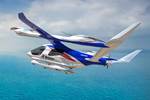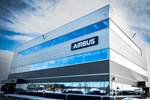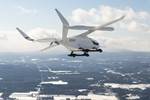Helijet places order for passenger service eVTOL aircraft in Canada
Purchase of the composite Alia eVTOL aircraft from Beta Technologies is helping develop AAM in British Colombia.

Photo credit: Beta Technologies
Helijet International Inc. (Richmond, B.C., Canada), a helicopter airline, plans to become the first Canadian air carrier to provide passenger and cargo services using electric vertical takeoff and landing (eVTOL) aircraft after placing firm orders for the Alia eVTOL aircraft from Beta Technologies (Burlington, Vt., U.S.), which uses composite materials (read “Solvay becomes Beta Technologies material supplier for AAM”).
The five-passenger and pilot-configured Alia eVTOL aircraft from Beta Technologies is in advanced flight standards development toward commercial regulatory certification in 2026. It will be available for private and commercial service shortly thereafter.
Helijet will integrate the designed aircraft into its existing network of helicopter services, providing quieter, lower cost, sustainable air transportation for travelers in southwestern B.C. and the Pacific Northwest. The electric aircraft’s VTOL capability will also have potential to improve Helijet’s provision of emergency response, air ambulance and organ transfer services in the Lower Mainland, as well as support rural and remote communities that do not have access to affordable and convenient air services.
Helijet’s decision to become Beta’s first commercial customer order from Canada is because of Beta’s intention to certify the aircraft for instrument flight rules operations, and its interest to consider growing its industrial base in Canada. Beta has already begun to grow its presence across the country with an R&D facility based out of the Montréal-Pierre Elliott Trudeau International Airport.
“We are committed to introducing and integrating zero-emission, vertical lift technologies and related ground/building infrastructure in the communities we serve, and look forward to transforming our current heliport infrastructure to meet future urban air mobility vertiport standards,” Danny Sitnam, Helijet president and CEO, says.
The purchase of Beta’s eVTOL aircraft is another demonstration of Helijet’s commitment to advanced air mobility. In 2019, Helijet became a founding member of Canadian Advanced Air Mobility (CAAM), the national organization for AAM in Canada. CAAM has created a 100+ member ecosystem comprised of industry, academia, capital and government members nationally and internationally.
“We designed Alia to be a reliable, efficient and sustainable aircraft option that could carry out a variety of missions in all types of geographies, and we’re thrilled to be partnering with Helijet to bring this next generation,
net-zero technology to Canadian commuters and travelers,” says Kyle Clark, Beta’s founder and CEO.
Over the past 2 years, Helijet has followed and shortlisted three aircraft manufacturers designing and developing eVTOL aircraft for advanced air mobility (AAM) ecosystems. In addition to Beta’s Alia eVTOL, which meets Helijet’s future objectives for introducing sustainable, decarbonized aviation technologies in Canada, Helijet continues to consider other shortlisted aircraft make and models for order. Helijet is also part of the development of Canada’s first commercial vertiport at its downtown Vancouver waterfront heliport, which would connect AAM users to an intermodal transportation hub providing road, marine, air and rail access throughout the region.
Related Content
-
Lilium launches M&A process, targets eVTOL program continuation
Despite court-approved insolvency filings and beginning first investor briefings, Lilium remains fully focused on re-emerging following restructuring, setting its sights on fresh investment to support the Lilium Jet.
-
Alef Aeronautics earns FAA approval to launch flying car
FAA certifies testing of California startup Alef’s all-electric composite vehicle, which is drivable on public roads and has VTOL capabilities.
-
Composites end markets: Aerospace (2023)
With COVID in the past and passengers flying again, commercial aircraft production is ramping up. The aerocomposites supply chain is busy developing new M&P for an approaching next-generation aircraft program.








.jpg;maxWidth=300;quality=90)





